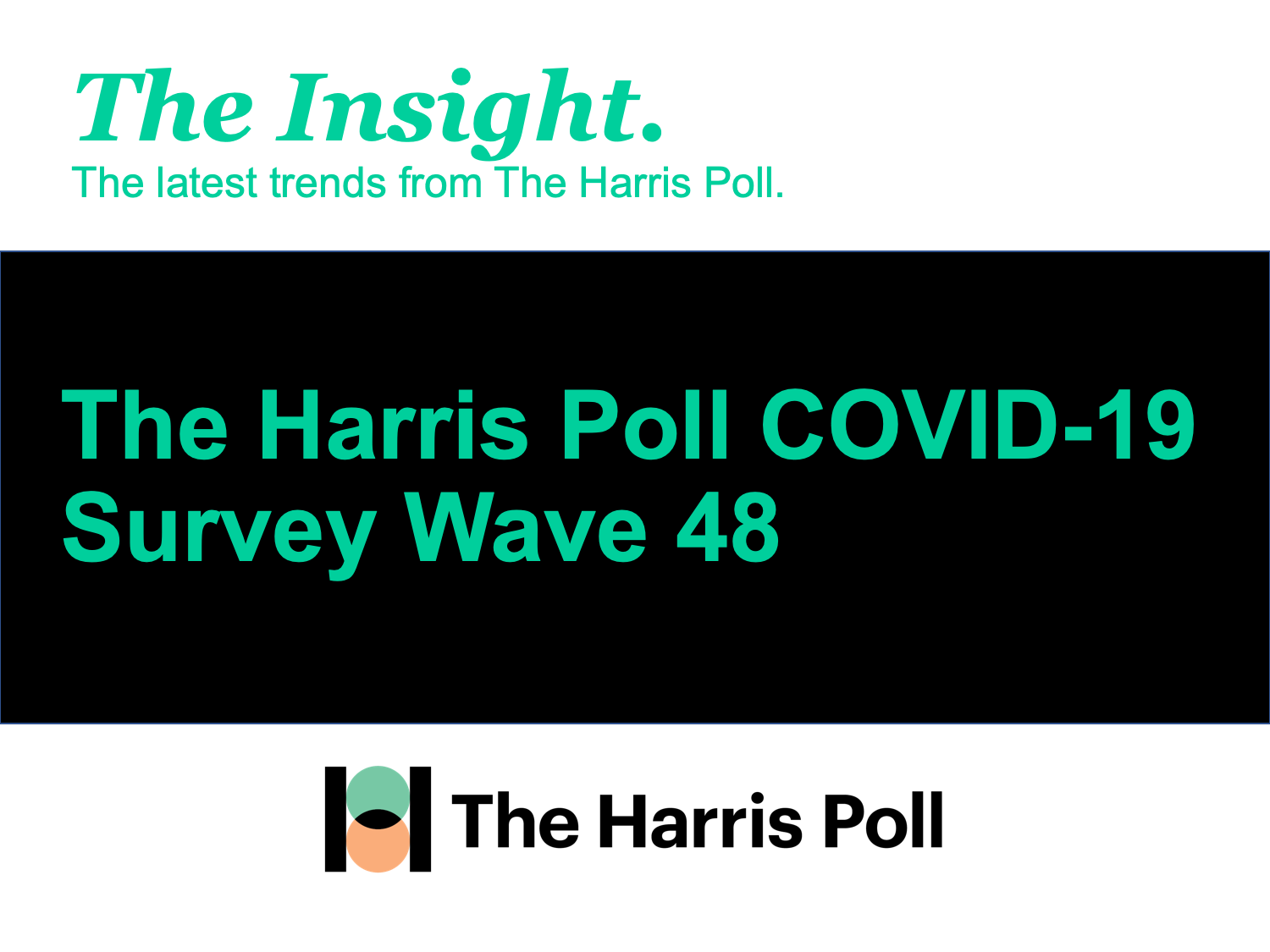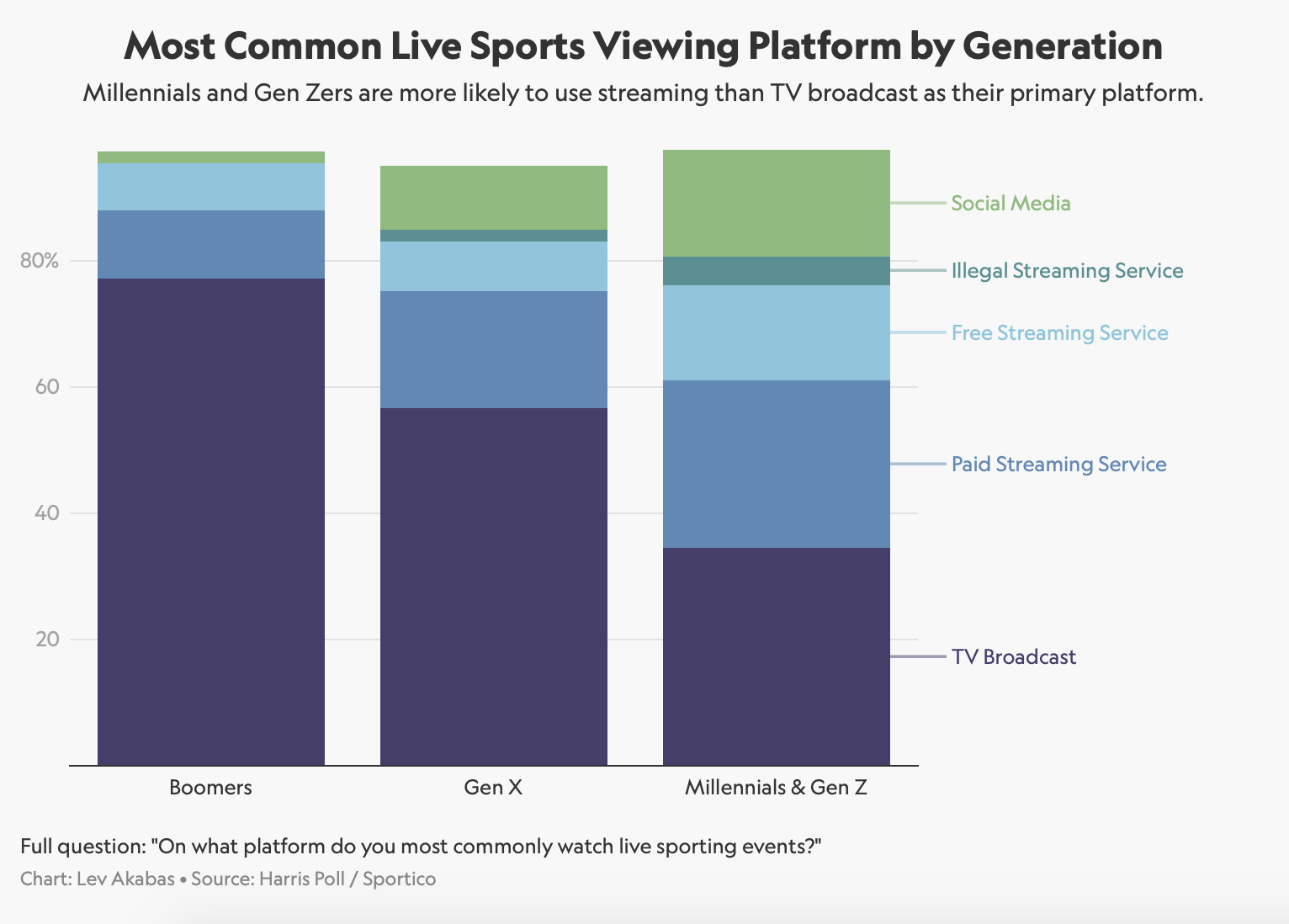Brief • 3 min Read

In The Harris Poll COVID-19 Tracker (Week 48) fielded January 22nd to 25th, 2021 among 1,956 U.S. adults, we look at public approval of social media’s handling of misinformation, how most Americans understand concerns about the vaccine, how students are adapting to a COVID education, the age of sports streaming for younger Americans, and the high support for some type of student loan reform.
As a public service, our team has curated key insights to help leaders navigate COVID-19. Full survey results, tables, and weekly summaries can be accessed for free at The Harris Poll COVID-19 Portal. We will continue to actively field on a regular cadence to track the shifts in sentiment and behaviors as the news and guidelines evolve.
Is Tech Doing Enough After the Capitol Attack? Depends on Who You Ask: USA Today-Harris Poll
Have the nation’s leading tech companies been doing a good job handling violent threats, hate speech and conspiracy theories after the attack on the U.S. Capitol? In a survey shared exclusively with USA Today, we asked Americans how social media companies are handling the fallout.
- More than a third (37%) of Americans say they approve of how social media companies are cracking down on potentially harmful or dangerous content, with (28%) saying they have gone too far and 23% saying they haven’t gone far enough.
- Opinions largely split along party lines: Half (51%) of Democrats saying tech companies were doing a good job, compared with (25%) of Republicans.
- Younger Americans are more likely to approve: (41%) of Gen Z and Millennials and (43%) of Gen Xers say social media companies are doing a good job versus (25%) of Boomers and (36%) of seniors. Older Americans were more likely to say the companies have gone too far, (35%) of Boomers versus (22%) of Gen Z and Millennials.
- A majority (55%) say it was necessary for Twitter to remove over 70,000 accounts linked to conspiracy theories following the riots; only (31%) say it went too far.
- No trust in social media: (69%) of Americans, including (76%) of Republicans and (59%) of Democrats, say they do not trust social media – higher than Congress (56% do not trust) or the national media (52%).
Takeaway: As our CEO John Gerzema says, “Most Americans saw the actions taken by Big Tech in recent weeks as necessary, but they’re still deeply skeptical of the power and influence these companies have.”
Americans Say Vaccine Skepticism Is Legitimate
Though nearly three-quarters of Americans (72%, up 12-pts since the first inoculation on December 15th) say they are likely to get a COVID-19 vaccine as soon as they are able to, many Americans (28%) are more hesitant. We asked Americans if they feel hesitation to take a vaccine is reasonable and found most of the public, even those willing to take a vaccine, understand the concerns of their fellow Americans.
- A majority (55%) of Americans say those with concerns about the COVID-19 vaccine are legitimate, while only (30%) say they are overreacting.
- What do Americans consider to be reasonable concerns? Nearly three-quarters (73%) say concern about side effects is reasonable, while (61%) say concern the development was rushed too quickly, (61%) say not knowing what is in it, and (53%) not trusting the government to determine if the vaccine is safe are reasonable concerns. Only (34%) say it’s reasonable for someone to not take a vaccine because the seriousness of COVID is overblown.
- Those unlikely to get the vaccine say they will “wait and see”: (39%) of the public plans to get their vaccine the first day they are able to; while over one-quarter (28%) say they will wait awhile and see. Interestingly, half (47%) of those not likely to take the vaccine say they will wait it out and see, indicating they aren’t entirely “anti-vax”, but are open to going once they feel comfortable. 1 in 10 (10%) say they will get the vaccine when they get around to it, (8%) have already received it, and (15%) won’t go at all.
- Two-thirds (66%) of Americans say the C.D.C. is doing a good job explaining the safety and any possible risks of the vaccine to the public, while Dr. Fauci (63% good job), Pfizer (62%), and President Biden (61%) are also viewed as effective messengers. The national media (54% good job) and Trump (36%) less so.
Takeaway: America is making steady progress in earning the trust of the public in the safety and efficacy of the available COVID-19 vaccines. However, Wall Street Journal explores how lack of public confidence in the vaccine in France is eroding the country’s vaccination plans.
Students Look to Their Schools for the Path Forward
Just yesterday, C.D.C. officials announced schools can be safe if precautions are taken on campus and in the community. In addition, many university officials say that lessons from the fall will allow them to bring even more students back onto campus when classes resume for the spring. This weekend, we checked in with students ages 18-24 on all of this and more, here’s what we found:
- Majority (68%) of students say their school is doing a good job of communicating the current state of COVID-19 at their school and say COVID-19 policies are just right (59%) vs only (22%) who say they’re not strict enough and (18%) who say they’re too strict.
- Student are looking for trusted sources on the vaccine, and turning to their schools’ leadership: Over a quarter (26%) admit they don’t know enough about the vaccine, and many are looking to their school administration first for information on the vaccine (41%) the same amount are looking to their school’s health advisory committee (41%).
- “Don’t label us superspreaders”: While many have called out students as reckless superspreaders (73%) say “some college students are being too reckless with socializing given COVID-19 that is giving all students a bad reputation.”
- On the contrary, similar amounts show sincere concern and regard towards the pandemic: (76%) are concerned about contracting COVID, (63%) are likely to take the vaccine and (74%) recognize they will need to continue to follow safety protocols after vaccination to keep others safe until we reach herd immunity.
- All of this is adding to the mounting pressure on students’ mental health and they’re calling for change; (78%) say “we need new resources to address mental health issues during COVID-19 because current resources are not enough.”
Takeaway: Transparency is the foundation of Gen Z’s ethos, and they’re calling attention to critical issues that are impacting Americans of all ages, such as lack of knowledge on the vaccine, mental health and racial inequality. We must continue to listen to students, especially during this critical time as campuses start to reopen amid the vaccine roll out, if we want holistic healing.
Streaming Prevails for Gen Z as Boomers Sustain Linear TV Dominance: Sportico-Harris Poll
In a partnership with Sportico, Harris Poll surveyed Americans on their sports viewing habits. The data reveal that more Millennials (ages 25 to 39) and members of Gen Z (younger than age 25) use streaming rather than television broadcast as their most common platform for viewing live sporting events.
- The generational divide is stark: among those who watch live sports, more than three-quarters (77%) of Boomers most commonly watch a TV broadcast, as compared to (57%) of Gen X and just (35%) of Millennials and Gen Z
- Television is not obsolete: half (51%) of the public watches live sports on TV broadcasts—but many use alternative platforms even if TV is their primary outlet. Nearly a quarter (24%) of all consumers watch on a paid, official streaming service, while (21%) watch on a free, official streaming service and (19%) watch on social media.
- Some younger fans are eschewing larger screens entirely: (64%) of Millennials watch live sports on a television, a hefty (41%) watch on their phones. A similar ratio exists among Gen Zers (48% to 31%). Notably, the three groups of sports fans we analyzed—boxing, NFL and NBA fans—were each more likely to watch sports on a phone than on a computer or tablet.

Takeaway: CBS’s successful Nickelodeon NFL broadcast last weekend may spawn similar experiments in engaging the younger audiences through TV, but at some point leagues may have to make more radical changes than end-zone slime eruptions and meet Gen Z fans where they are; that is to say, not on their couch in front of a television.
Americans Overwhelmingly Support Student Debt Reform
In a new Harris Poll, we found that Americans overwhelmingly support multiple reforms for the student loan debt crisis. This may present a perfect opportunity for Biden’s administration to fix a long-time national issue, and what’s more, the majority of Americans agree he’s up to the task.
- Frequently recommended solutions are supported by more than half of Americans: forgiveness of a flat amount of student debt (64%) and forgiveness of all student loan debt (55%). Additionally, nearly two-thirds of Americans (63%) support forgiveness of all student loan debt for those working in certain industries like health care, science & technology, or public service.
- Support is high for other potential solutions including lower interest rates on students that attend public universities (83%), automatic student loan forbearance if someone loses employment (72%), and updating bankruptcy laws to get rid of student debt (66%).
- Even though only (17%) of Americans think the president should have the primary responsibility for fixing the student loan debt crisis, (57%) of Americans agree that the incoming presidential administration is capable of fixing the student loan crisis. In fact, (53%) of Americans agree that the Biden administration will fix the student loan crisis within the next four years.
Takeaway: In an article citing our data, Axios dives into the complications of student loan reform, noting “there’s a growing consensus among Americans who want President Biden to cancel student debt — but addressing the ballooning debt burden is much more complicated than it seems.”
Subscribe for more Insights
Subscribe to our newsletter for the latest trends in business, politics, culture, and more.
Download the Data
This survey was conducted online within the U.S. by The Harris Poll from January 22 to 25, 2021 among a nationally representative sample of 1,956 US. adults.
Download
Subscribe for more Insights
Subscribe to our newsletter for the latest trends in business, politics, culture, and more.
Download the Data
This survey was conducted online within the U.S. by The Harris Poll from January 22 to 25, 2021 among a nationally representative sample of 1,956 US. adults.
DownloadRelated Content








